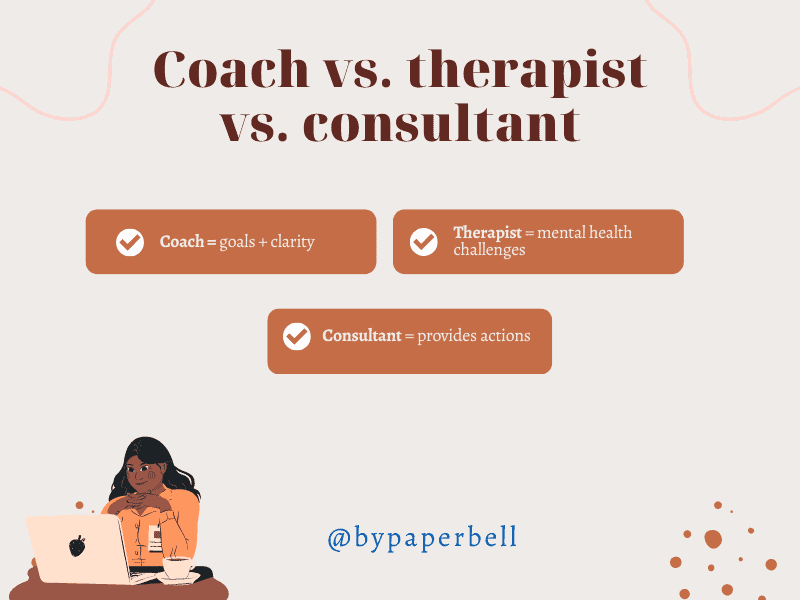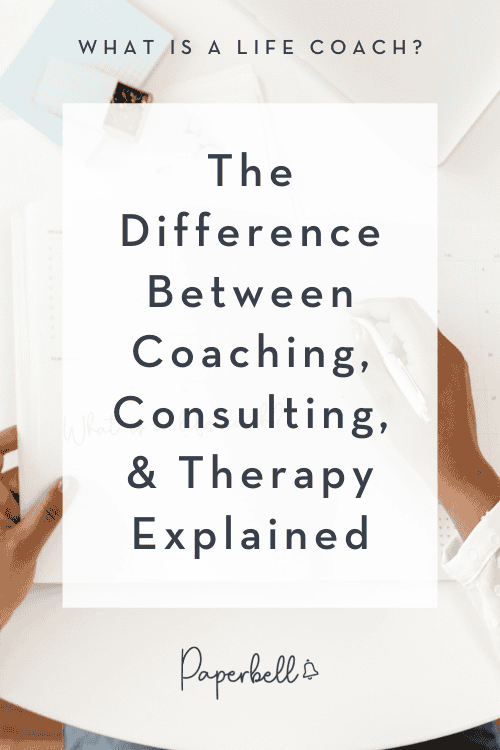Life coaching is a transformative profession that helps people create meaningful change in their lives. While there are nearly as many coaching approaches as there are coaches, at its core, coaching is about helping clients bridge the gap between where they are today and where they truly want to be.
Many people confuse coaching with therapy or consulting—and it’s easy to see why. All three help people solve problems and make progress. But each serves a completely different purpose in your personal growth journey.
In this article, we’ll clarify what life coaching really is, how it differs from similar services, and how to know which type of support might be right for you.
What is Life Coaching?
Life coaching is the process of helping clients gain clarity about different aspects of their lives, define clear goals, and find ways to achieve them.
Some clients enter their first coaching session with a clearly defined purpose, but more often than not, they enter with a vague challenge they’re facing. This challenge might show up as:
- A feeling of being stuck
- Being unable to move on from a situation
- Facing the same issues repeatedly without making progress
The life coaching process usually starts with uncovering these challenges and what the real or underlying issue is. The coaching process either ends with this newfound clarity or shifts its focus to a new issue.
It’s normal for the client’s goals to change over time as they go through personal transformation. This isn’t a setback but simply the natural byproduct of developing self-awareness and growing into a new person. When we change our beliefs, needs, and priorities change as well, helping us live more aligned with who we are.
Reflection is one of the most important catalysts for becoming more self-aware, and that’s exactly what a life coach helps their clients with. Professional coaches never impose their own views or solutions on the coachee but rather help them reflect on themselves, gain clarity about their beliefs, and consciously choose what they want.
What Do Life Coaches Do?
Life coaches help people transform their lives using a variety of tools and approaches. They work with clients one-on-one or in groups, guiding them toward positive change and personal growth.
In these sessions, the client sets the agenda, and the coach asks thought-provoking questions to help them gain clarity and move forward. A good coach knows exactly which questions will spark the most insight for each unique situation.
Between sessions, coaches typically:
- Assign coaching exercises that reinforce new habits or perspectives
- Provide accountability to keep clients on track with their goals
- Check in on progress and adjust strategies as needed
- Offer support when obstacles arise
Unless they work in-house for an organization, most life coaches are also small business owners. This means they’re handling everything from creating their services and marketing their business to managing finances and paying taxes, just like any entrepreneur would.
At the heart of it all, most coaches focus primarily on delivering transformative sessions for their clients. They’re constantly improving their coaching skills, developing new methodologies, and expanding their toolbox. Many continue their education throughout their careers, adding complementary approaches like emotional freedom technique (EFT), neuro-linguistic programming (NLP), or breathwork to enhance their coaching practice.
Pro tip: Use Paperbell if you’re planning to start your own coaching business. Save hours building a beautiful website and start getting clients right away.
Different Types of Life Coaches
Coaching can take many forms, depending on the coach’s approach and expertise and the area they focus on. These are the most common types of coaches in the industry.
- Business Coaches
- Financial Coaches
- Executive and Leadership Coaches
- Organizational Coaches
- Career Coaches
- Family Life and Relationship Coaches
- Health and Wellness Coaches
- Spiritual Coaches
- Positive Psychology and Mindfulness Coaches
- Confidence Coaches
Within these major categories, you’ll also find coaches with a more specialized focus, such as body-image coaches or divorce coaches. Many of them develop an interest in a particular niche because of something they have gone through in their personal or professional life themselves.
However, just because a coach hasn’t been married, it doesn’t mean that, for example, they can’t be well-versed in relationship coaching for married couples. Their qualifications and ability to ask powerful questions go way beyond personal experience, whether they’ve been certified and had formal training or not.
[ Read: Types Of Life Coaches: The Top 12 Niches That Clients Love ]
Why Should You Work with a Life Coach?
Most people hire a coach because they feel stuck in their life or career, are dealing with difficult emotions, or are going through a life transition. However, there are many other reasons why you should seek help from a coaching professional. For example:
- Going through a career transition
- A lack of fulfillment at work
- Looking for a sense of purpose
- Being stuck with a project
- Feeling creatively drained
- Wanting to be a more effective leader or manager
- Starting a business
- Difficulty making a complex life or career decision
- Being unclear about your true identity
- Lacking motivation for your goals
- Needing help with life planning
- Wanting to increase your income or improve your financial stability
- Facing relationship challenges
- Going through a breakup or grieving a loved one
Human life has various complex challenges, and we all go through difficult periods when we could use a little help.
Coaches can provide much more than just an outside perspective or the comforting presence you normally seek from a friend. From career planning to dealing with personal issues, professional coaches have proven methods and tools to help you no matter how tough your situation is.
[ Read: 8 Types of Life Coaching Services (And How to Find Your Perfect Coach) ]
Many entrepreneurs, high-level leaders, athletes, and artists work with one or more coaches on their goals and performance. These people usually have to make high-risk decisions and deal with emotionally or physically challenging situations in their everyday work that are hard to get through on their own.
But life coaching isn’t just for A-list professionals; it’s for anyone who needs clarity and guidance in their lives. Luckily, more and more people realize that asking for help is okay and that investing in themselves pays off in the long run.
Whether you want to learn something specific, build confidence, or find more clarity, working with a life coach can bring you positive changes.
What is the Difference Between Life Coaching and Therapy?

In a nutshell, life coaches focus on future goals and personal growth, while therapists address mental health issues and explore past traumas.
Therapists are often confused with life coaches. These two areas do have some similarities in the sense that they help people feel better and progress in their lives. Life coaching and therapy serve different purposes, though.
When we talk about therapy, we refer to the work of psychiatrists and psychologists, also called therapists or mental health professionals. Here are the difference between the two:
- Psychiatrists are licensed mental health professionals who can prevent, diagnose, and treat mental health conditions. They can perform medical tests and prescribe medication.
- A psychologist is a licensed professional, too, but not a medical doctor. They can’t prescribe medication or diagnose their clients, but they can provide talk therapy and help with mental health issues such as anxiety, depression, mood or eating disorders, and addictions.
A life coach, in turn, doesn’t need to be licensed to work with clients. They can get certified at a training institution like the International Coaching Federation (ICF) or the European Mentoring and Coaching Council (EMCC), but it’s not a requirement for them to practice coaching.
What’s common in all three of these service providers is that they all focus on helping people stay mentally well, but their methods largely differ. Therapy usually focuses on managing mental health issues and healing from past trauma. It allows clients to process life events and learn new tools to cope with difficult emotions.
In this sense, therapy normally focuses more on issues triggered by past events, while coaching tends to be more future-facing. Of course, there can be an overlap between both methodologies. But normally, it’s more beneficial for the client to start with therapy around a key issue and then progress into coaching later.
Needless to say, neither is better than the other. They simply provide different tools for change. Clients often go through multiple therapy and coaching processes at specific turning points in their lives.
Example of Therapy vs. Coaching
Let’s say you’ve been losing motivation at work lately and need help figuring out how to feel more inspired about your everyday work.
If you suspect that this might be tied to a larger issue connected to your mental health, a therapist might be a better option. For example, high-functioning depression might go unnoticed behind a facade of performing your daily routine tasks. You may feel that the activities that used to give you joy don’t bring you the same feeling anymore. You always feel chronically tired and lethargic, have prolonged sleep issues, and avoid social activities.
On the other hand, if you’re feeling good about other areas of your life but you’re simply bored with the work you’ve been doing, you may benefit more from coaching. A career coach can help you gain clarity of not just your current job situation but your long-term career path as well, helping you find personal fulfillment.
What is Coaching vs. Counseling?
Coaching focuses on goal-setting and future growth, while counseling addresses emotional issues and healing from past experiences.
Counseling is very similar to therapy; licensed psychologists or therapists perform both. However, counseling is a short-term process with a particular focus problem or situation. It can take a few weeks to a few months, and it’s usually centered around a predefined issue, such as the grief of a loved one.
So, the key difference between counseling and coaching is that counseling helps with mental health issues and healing trauma, while life coaching is more likely to focus on building self-awareness and moving toward personal goals.
What is Consulting vs. Coaching?
Consulting is another profession commonly mistaken for business or career coaching. The most important difference is that a consultant gives their clients the answers they need, while a coach helps them find answers on their own.
A consultant has to have expertise in the area they’re advising, but a coach doesn’t necessarily need to be well-versed in the client’s personal or career situation.
Consultants give instructions; coaches give guidance. If a professional or a team needs out-of-the-box thinking and new perspectives, they will turn to a coach. They will work with a consultant if they need concrete solutions from someone who’s seen the same problems before.
Example of Coaching vs. Consulting
Let’s say that you’re leading a team of professionals, and you’re feeling stuck with a few problems stubbornly hindering your performance as a leader.
A consultant specializing in your area can guide you on what typically works in these situations. They may have experience advising leaders within your field and can suggest industry-specific frameworks.
On the other hand, a leadership coach can help you identify the root causes of your performance struggles, develop strategies to overcome them, enhance your leadership skills, and build confidence. All of these will ultimately improve your effectiveness as a leader.
Over to You
So now you know the answer to the burning question: “What is a life coach?” You can now decide whether you want to find a coach, a therapist, or a consultant to work with.
To recap:
- A life coaching session can help you with your personal or professional goals, the obstacles in their way, and how to overcome them.
- A licensed therapist can help you manage mental health issues and heal from past trauma.
- A consultant can help you with a specific business problem and explain how to fix it.
If you’re thinking of becoming a coach, you may want to research the various niches in the industry. Here’s an easy guide for you to find your specialty.
FAQ
What Does a Life Coach Actually Do?
A life coach can help you set and achieve personal or professional goals through guidance, support, and accountability.
What is the Role of a Life Coach?
A life coach’s role is to assist you in identifying your goals, overcoming your obstacles, and creating actionable plans for success.
What is the Difference Between a Life Coach and a Therapist?
Life coaches focus on future goals and personal growth, while therapists address mental health issues and explore past traumas.

Editor’s Note: This post was originally published in November 2021 and has since been updated for accuracy.









